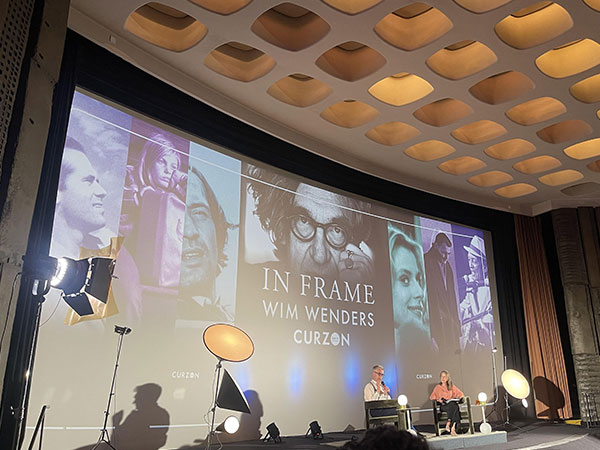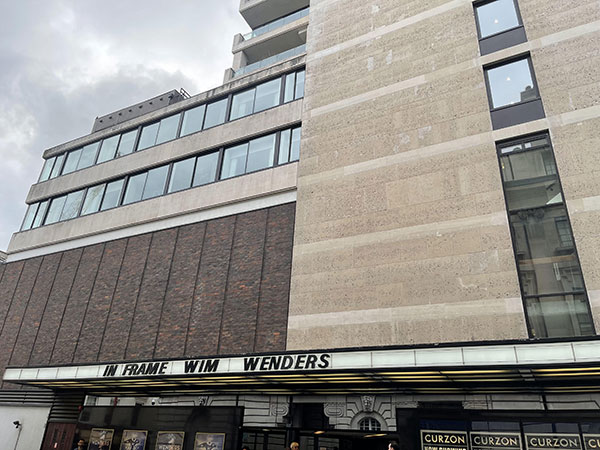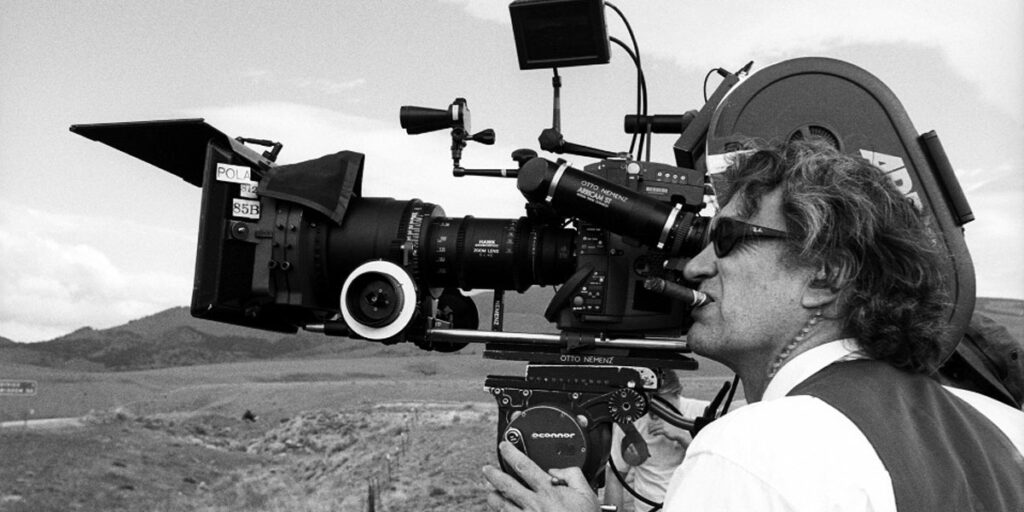Wim Wenders discussed his life as a filmmaker at Curzon’s event ‘In Frame: Wim Wenders’, the beginning of a nationwide reliving of Wenders’ work.
There’s something so special about being in a room full of people who are all fascinated by Wim Wenders. It feels like a once in a lifetime opportunity to be sitting five rows back from Wenders himself as he talks about his life, influences and the future. Presenter Francine Stock joined Wenders onstage to ask him all the important questions, as well as opening it up to the audience of cinephiles. This is the beginning of a new strand to Curzon’s ever expanding programme which focuses on live events with filmmakers in partnership with How To Academy. ‘In Frame: Wim Wenders’ also kicked off ‘Kino Dreams’, a retrospective of rereleases of Wenders’ most well-loved films across Curzon cinemas.
Wenders didn’t originally plan on becoming a filmmaker but he’d always been engrossed by moving images. At first, he began painting. Creativity ran through his blood from a very early age. His curiosity for the arts expanded beyond painting when his dad brought down boxes of Laurel and Hardy films from the attic one day, and Wenders never looked back. “I was in awe of endless frames” Wenders told Stock, “I saw 20 cent movies…movies from all over the world”. Wenders tried to see every single film possible that was showing at his local cinema. Some days he managed to see up to five films. He started making notes in the cinema when he was forgetting what had happened during the first film of the day. “I had mastered the skill of taking notes in the dark,” Wenders says, and the audience laughs. This was the beginning of his writing days. Shortly after, he started writing professionally as a film critic for local and national papers.
Germany had always been Wenders’ home. He was born merely 19 days before the end of World War Two in Düsseldorf. Wenders had an initial fascination for American cinema rather than German cinema as “American cinema was more appealing”. He wanted to make films like the Americans as this was what he had mostly grown up with. However, this way of thinking was short-lived as, after visiting America, he realised that he needed to make German films instead and stick with his roots. Living in America brought out the true European inside of him. The American Dream that he once thought was something magical now existed only in his head. Wenders went on to say that “the best American movies have all been made by foreigners…and the greatest sci-fi films are made by Brits”.

Road films are a recognisable staple in Wenders’ filmography. In 1974 he began his Road Movie trilogy with Alice in the Cities, followed by The Wrong Move (1975) and King of the Roads (1976). All three take place in Germany, following on from Wenders’ discovery that he should stick to his German roots. Paris, Texas (1984) is one of the most notable in Wenders’ filmography, and one of the the most well-known road films of the 80s. Wenders goes on to tell an anecdote of how him and his crew “went to America on tourist visas to make Paris, Texas”. He tells the audience how they went “guerrilla” and how it was quite “dangerous” when filming Paris, Texas. Wenders hired all Europeans to make Paris, Texas and flew everyone over instead of recruiting crew members from America.
One thing that Wenders absolutely stands by from his exhaustive filmmaking days is casting actors who he genuinely respected and liked. He had to get on with them on and off the set. When filming The American Friend (1977), Wenders recalls Dennis Hopper arriving in Hamburg only “three days after filming Apocalypse Now (1979)”. There wasn’t an instant warm feeling from Hopper as “he hadn’t learned his lines” and was a little all over the place. Hopper and co-star Bruno Ganz also didn’t get on too well and during one of the days of filming they completely “disappeared for hours” (they were later found at a local bar). Wenders originally wanted to cast John Cassavetes as Ripley instead of Hopper, but Cassavetes suggested Hopper for the role instead and the rest is history.
When Stock gave the audience the chance to ask questions, someone near the back asks a very important question: “do you think that there is artistic integrity?”. Wenders pauses for a few seconds to think and answers with, “maturity is dangerous for an artist”. He proceeds to say, “you can’t do things just because you know how to”. Wenders is someone who many look up to as a very influential filmmaker, especially when it comes to European cinema. There are many artists nowadays that make art for the sake of it and not because they’re passionate about every project. But Wenders is one that has stayed true to himself and his values right from the very start. He’s also stayed true to his peers and his friends. He remains friends to this day with another New German Cinema founder Werner Herzog, whom he describes as a “wonderful sweet man”.
“The most innovative films now are documentaries” Wenders responds to a question on innovative cinema. Wenders has made countless documentaries during his time as a filmmaker. Buena Vista Social Club (1999) is one of the most remarkable documentaries among his body of work. Wenders has a passion for watching and making documentaries and has always channelled a positive energy into anything he’s made. In particular, Wenders has an adoration towards music documentaries and music in general – especially American music, both North and South. This can be seen in almost any of his films, with the soundtracks featuring American music.

In 1982 at the 1982 Cannes Film Festival, Wenders asked a collection of directors their opinions on what they thought the future of cinema would be like. He recorded this on 16mm and it was screened at the 2006 Cannes Film Festival under the title Room 666. Wenders has always held a curiosity for the future of cinema and has had the pleasure of watching the concept of filmmaking grow into something undeniably huge. “Technology has changed the way we tell stories,” Wenders tells Stock. He believes that cinema will continue to grow as time goes on and hopes that the physical elements of distribution stick around (DVD’s and going to the cinema) rather than everything being completely digitised.
Curzon’s retrospective ‘Wim Wenders: Kino Dreams’ took place on 24th June and continues across UK Curzon cinemas until the 30th August 2022. If you’re unfamiliar with Wenders’ work or want to relive his masterpieces on the big screen, you most definitely should get yourself down to one or a few of the screenings this summer. These screenings include showings of The American Friend, Wings of Desire and Paris, Texas.
Curzon’s “Wim Wenders: Kino Dreams” retrospective took place on 24 June-30th August 2022.

